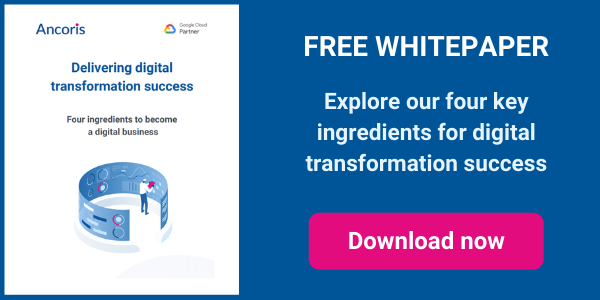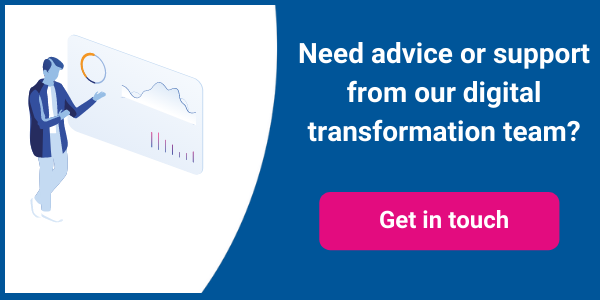No organisation or industry sector is immune to the disruptive effects of digital and mobile technologies. Even if you’re not re-inventing a whole new category or turning an existing one on its head — think AirBnB, Uber and Just Eat — becoming “digitally mature” will be vital to your long-term survival and competitiveness. It’ll allow you to handle changing customer expectations and increasingly intense competition from rivals which have already exploited digital technologies to optimise their operations and drive down costs.
In fact, research by the MIT Center for Digital Business found that, compared to the industry average, digitally mature companies:
- are 26% more profitable
- generate 9% more revenue per employee and from the equivalent physical assets
- see their stock valued at 12% higher
So every organisation needs to embark on a journey to digital maturity if it wants to benefit from this digital advantage.
How to become a digitally mature company?
Simply investing heavily in digital initiatives is not enough. It’s true that digital transformation can help you provide better customer service, enable your teams to work more collaboratively, and allow you to make better use of data in decision-making. But to reap the benefits of these kinds of initiatives, organisations need to take a coordinated and controlled approach, ensuring they take the following actions.
Have a strong overall vision
Have a strong overall vision that helps everyone picture how the company will be different in the future and gets to the heart of what value the company really provides for its customers. They’re willing to challenge everything — across every function, process, product and location — and are ambitious in their targets. But they measure success in terms of the value they get out of digital initiatives, not the volume of activity and effort.
Create the right cultural environment
This will help to drive through digital transformation, with engaged employees who are not only fully on board with adjusting to the changes that digital technologies will bring but who also understand the company's vision well enough to suggest new opportunities. Companies on the road to digital maturity are also not afraid to extend their capabilities by hiring in new skills from other sectors, while they ring-fence digital talent so it doesn't get distracted by “business as usual”.
Build strong relationships between IT and business
Get everyone committed to a shared vision and willing to completely re-define how things are done. This helps the organisation to move quickly — supported by infrastructure and processes that facilitated agile development, of course — and means it’s prepared to constantly reinvent itself.
Develop effective rules for investing
Investing in digital technologies and co-ordinating different initiatives, with a focus on achieving excellence in one or two areas initially — such as mobile or customer experience or internal collaboration — rather than spreading the same level of investment and activity across multiple areas and achieving mediocre performance in all of them. Once a company has conquered one area, it can then build complementary digital capabilities and exploit the synergies between these different areas.
Recognise digital transformation is a process, not a one-off project
Companies become digitally mature when they are able to innovate continuously, constantly looking at how they can get more out of current systems, take advantage of new technologies to improve existing processes, respond to business innovations by competitors – or be the innovator.
What happens if you don’t take this coordinated and controlled approach? Companies that have invested heavily in digital technologies, but in a scattergun fashion, typically do see higher revenues—but at the expense of profitability. Companies that concentrate on making a few careful investments generally increase their profits but grow much more slowly, raising the risk that competitors will cut the market out from under their feet.
Process, People and Technology
Even with the right approach in place, however, you still face the challenge of delivering on your vision. The three basic ingredients in the recipe for any digital transformation project are processes, people and technology. But the flavour of each of these ingredients will change over time as the organisation becomes more digital mature.
- When it comes to process, organisations in the earliest stages of digital maturity typically concentrate on increasing efficiency and improving customer experience and engagement. As they become more digitally mature, they start to look at improving both innovation and decision-making. However, only when they approach a high level of digital maturity will they commit completely to transforming the business as a whole, rather than just addressing individual functions or processes.
- When it comes to people, digital strategies are currently being driven largely by CEOs and CIOs. There's a growing recognition, however, that the lead should be taken by the new roles of Chief Digital Officer or Head of Digital. The key differentiator is the complete focus in these roles on digital transformation and their ability to cut across traditional organisational boundaries.
- Finally, the technology used to deliver digital transformation strategies will evolve as new solutions emerge. Technologies that are already crucial to most digital transformation strategies include mobile apps, social media tools and social intranets, web collaboration tools, smartphones and other mobile devices, and workplace infrastructure. Emerging technologies that we expect to play an increasing role encompass data analytics, machine learning, containerisation, micro-services and APIs.
These are all areas of technology where Ancoris has considerable experience in helping customers to combine people, process and technology to deliver digital transformation initiatives and become more digitally mature.
For example, we helped Rentokil Initial, the global pest control specialist, to accelerate its digital transformation by digitally enabling 14,000 frontline colleagues in 38 countries via cloud-connected Android based apps for customer installation and servicing.
Working with our digital transformation specialists
If you're involved in the busy day to day and your teams have been working with a process a certain way for years, it can be hard to step back to imagine doing it in a totally different way.
Got an idea to transform your business and want help bringing it to life? We’re all ears. We design, build and manage customised mobile and cloud apps to meet your specific needs – either alongside your team or for you. Our early prowess in mastering APIs led to Google itself becoming a customer and us building their Exam Platform. So not only do we know our onions but you can trust us to deliver innovation and edge in spades.
If you’d like to find out more about how we can help you with your own digital transformation journey, why not take a look at some of our customer success stories or talk to our Digital Transformation Specialists.


